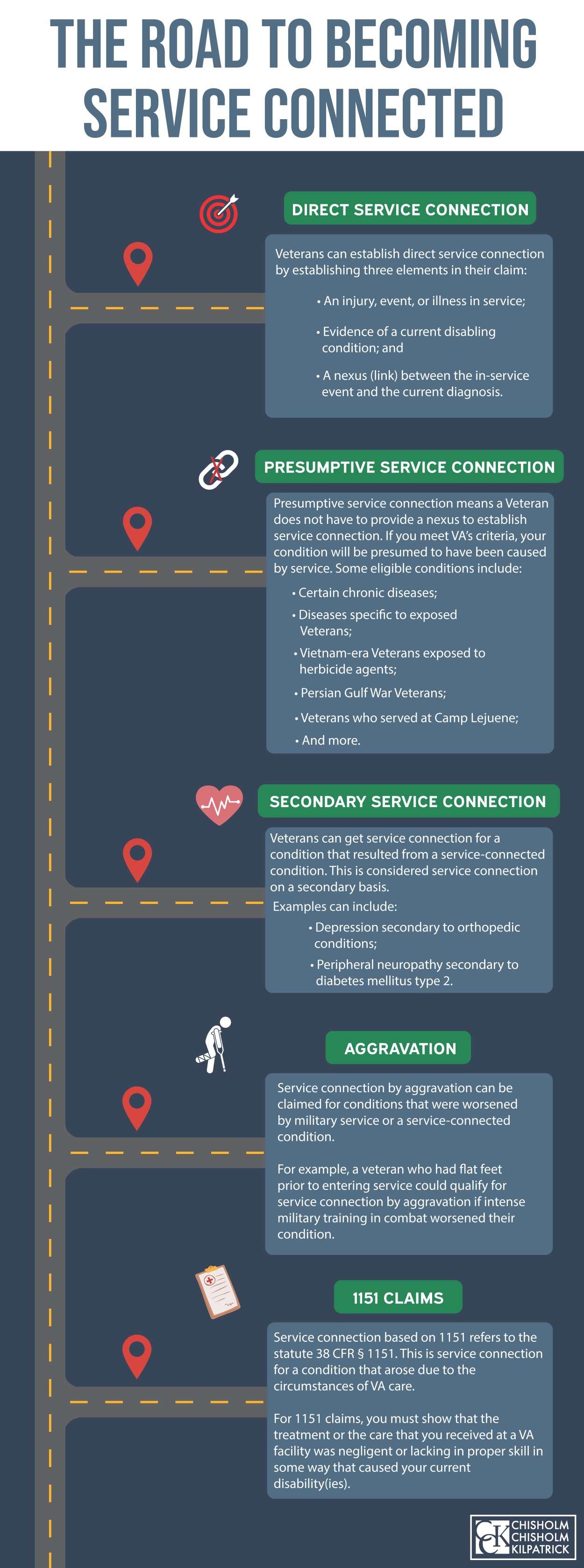VA Secondary Conditions to Fibromyalgia

CCK Law: Our Vital Role in Veterans Law
What Is Fibromyalgia?
Fibromyalgia is a condition that causes widespread (i.e., all over the body) musculoskeletal pain. For pain to be considered widespread, it must be on the right and left sides of the body and above and below the waist. The Department of Veterans Affairs (VA) also notes that it must also affect the axial skeleton and the extremities.
Fibromyalgia is usually accompanied by sleep problems, memory and mood issues, and fatigue. The condition can make it difficult to work and function on a day-to-day basis. People with fibromyalgia may also experience a heightened sensitivity to pain, which is known as abnormal pain perception processing.
Common Symptoms
People who have fibromyalgia may experience the following symptoms:
- Pain and stiffness all over the body
- Fatigue
- Depression and anxiety
- Issues with memory and concentration
- Headaches, including migraines
- Tingling or numbness in hands and feet
- Pain in the jaw
- Digestive issues and abdominal pain
Risk Factors and Treatments
Although the causes of fibromyalgia are not known, there are certain known risk factors associated with the condition. For example, the risk of fibromyalgia increases in older individuals. Those with lupus or rheumatoid arthritis also are more likely to develop fibromyalgia.
Fibromyalgia can be effectively treated and managed with medication and other self-management strategies, such as muscle-strengthening exercise, stress management techniques, good sleep habits, and cognitive behavioral therapy.
Complications of Fibromyalgia
According to the Centers for Disease Control and Prevention, individuals with fibromyalgia are three times more likely to develop major depression. The risk of suicide and injury is also higher among those with the condition, as are the rates of rheumatic conditions.
Gulf War Veterans and Fibromyalgia
VA created presumptions for Gulf War veterans under 38 CFR § 3.317, with the intention to make it easier for Gulf War veterans to obtain service connection. Gulf War veterans who served in a qualifying location between August 2, 1990 and December 31, 2026 and exhibit certain symptoms may qualify for presumptive service connection. Gulf War presumptions include (1) MUCMIs; (2) undiagnosed illnesses; and (3) certain infectious diseases.
VA considers fibromyalgia an MUCMI (i.e., a Medically Unexplained Chronic Multisymptom Illness). MUCMIs are defined by a cluster of signs and symptoms without conclusive pathophysiology (i.e., the mechanisms by which the disease operates) or etiology (i.e., unknown cause). Therefore, if a Gulf War veteran is diagnosed with fibromyalgia and meets the other qualifications, they can receive service-connection on a presumptive basis.
VA Ratings for Fibromyalgia
The Department of Veterans Affairs rates fibromyalgia under 38 CFR § 4.71a, diagnostic code 5025. Fibromyalgia can be rated at a 10, 20, or 40 percent depending on the frequency and severity of the condition.
The criteria for each rating depend on “widespread musculoskeletal pain and tender points” that:
- 40 percent – “are constant, or nearly so, and refractory to therapy”
- 20 percent – “are episodic, with exacerbations often precipitated by environmental or emotional stress or by overexertion, but that are present more than one-third of the time”
- 10 percent – “require continuous medication for control”

What Is a Secondary Condition?
Secondary conditions are conditions that developed as a result of a service-connected disability. Veterans can get VA disability compensation for a secondary condition if they prove secondary service-connection. Essentially, they must have evidence showing that the secondary disability was caused by a primary service-connected disability. This can be accomplished by providing VA with a nexus opinion from a medical professional.
When filing a claim for secondary service connection, veterans can use VA Form 21-526EZ. It is also important to note that veterans cannot be service connected for the same symptom more than once.
Common VA Secondary Conditions to Fibromyalgia
There are several secondary conditions to fibromyalgia that may qualify veterans for secondary service-connected compensation from VA. The following are the most common VA secondary conditions to fibromyalgia:
Migraines Secondary to Fibromyalgia
Migraines are a type of headache characterized by intense pain that can be accompanied by nausea, vomiting, sensitivity to light and sound, lightheadedness, and blurred vision. Migraines can be debilitating and can last anywhere from hours to days depending on the person.
Veterans who develop migraines due to their service-connected fibromyalgia may qualify for secondary service connection. VA rates migraine headaches under 38 CFR § 4.124a, diagnostic code 8100. Disability ratings range from 0 to 50 percent, depending on the severity and frequency of the migraines.
Depression Secondary to Fibromyalgia
Depression is a serious mental health condition that affects the way a person thinks, feels, and acts. Symptoms of depression tend to vary amongst individuals; however, common symptoms include the following:
- Persistent feelings of sadness, worthlessness, and hopelessness
- Lack of motivation or interest in activities that usually derive pleasure
- Difficulty sleeping and concentrating
- Change in appetite resulting in weight loss or weight gain
- Irritability
- Fatigue
Veterans who experience chronic pain due to fibromyalgia may become less active and more withdrawn, which can lead to depression. Veterans who develop depression secondary to fibromyalgia may be eligible for VA compensation.
VA rates depression using the General Rating Formula for Mental Disorders. Mental health conditions are rated at 0, 20, 30, 50, 70, or 100 percent depending on the level of social and occupational impairment and the severity of symptoms.
Anxiety Secondary to Fibromyalgia
Anxiety is defined as intense, excessive, and persistent worry and fear about everyday situations. The most common symptoms of anxiety disorders include the following:
- Feeling restless, jumpy, or on edge
- Excessive worrying
- Difficulty concentrating
- Rapid heartbeat
- Trembling or twitching
- Muscle tension
- Shortness of breath or difficulty breathing
- Feeling dizzy, nauseous, or lightheaded
- Difficulty sleeping
The stress of fibromyalgia and its symptoms often causes anxiety and social isolation. Veterans who develop anxiety secondary to service-connected fibromyalgia may qualify for disability benefits. VA may assign a veteran’s anxiety either a 0, 20, 30, 50, 70, or 100 percent rating using the criteria in the General Rating Formula for Mental Disorders.
Gastroesophageal Reflux Disease (GERD) Secondary to Fibromyalgia
Gastroesophageal Reflux Disease (GERD) is a digestive disorder characterized by the occurrence of stomach acid flowing back up the esophagus from the stomach, causing discomfort and inflammation. GERD is caused by frequent episodes of acid reflux, which has been heavily associated with fibromyalgia.
Symptoms of GERD typically include:
- Nausea
- Vomiting
- Heartburn
- Difficulty breathing
- Coughing
- Painful swallowing
- Chest pain
- Stomachaches or other abdominal pain
VA rates GERD under 38 CFR § 4.114, Schedule of Ratings – Digestive System, Diagnostic Code 7206. Ratings range from 0, 10, 30, 50, or 80 percent, depending on the severity of symptoms.
Temporomandibular Joint Dysfunction (TMJ) Secondary to Fibromyalgia
The temporomandibular joint acts like a sliding hinge, connecting your jawbone to your skull. Temporomandibular Joint Dysfunction (TMJ) disorders can cause pain in your jaw joint and in the muscles that control jaw movement. In most cases, the pain and discomfort associated with TMJ dysfunction is temporary and can be relieved with self-managed care or nonsurgical treatments.
Fibromyalgia may lead to the development of temporomandibular disorders, such as TMJ. VA rates TMJ under 38 CFR § 4.150, diagnostic code 9905. Ratings range from 10 to 50 percent depending on the interincisal range of motion (i.e., opening and closing of the jaw).
Irritable Bowel Syndrome (IBS) Secondary to Fibromyalgia
Irritable Bowel Syndrome (IBS) is a disorder that affects the large intestine and can cause stomach cramping, pain, diarrhea, gas, or constipation. IBS is a chronic condition that impacts many veterans.
According to the UNC Center for Functional GI & Motility Disorders, around 70 percent of individuals suffering from fibromyalgia also have symptoms of IBS. Veterans who developed IBS following their service-connected fibromyalgia may be eligible for VA service-connected compensation on a secondary basis.
VA rates IBS under 38 CFR § 4.114, diagnostic code 7319. IBS is rated at 0, 10, or 30 percent depending on whether it is mild, moderate, or severe.
Sleep Apnea Secondary to Fibromyalgia
Sleep apnea is a potentially serious sleep disorder in which a person’s breathing is repeatedly interrupted throughout the night. Fibromyalgia is known to trigger chronic fatigue and other sleep issues, such as sleep apnea.
There are three main types:
- Obstructive – the most common form of sleep apnea, occurs when the throat muscles intermittently relax and block your airway during sleep.
- Central – occurs when the brain doesn’t send proper signals to the muscles that control breathing.
- Complex (Mixed) – occurs when someone has both obstructive and central sleep apnea.
For mild cases of sleep apnea, doctors may suggest lifestyle changes such as losing weight or quitting smoking, if applicable. In more serious cases, doctors may prescribe the use of a continuous positive airway pressure (CPAP) machine.
VA rates sleep apnea under 38 CFR § 4.97, diagnostic code 6847. Veterans are assigned a 0, 30, 50, or 100 percent VA rating based on the severity of their condition.

Was Your VA Disability Claim Denied?
If VA denied your claim for fibromyalgia or for conditions secondary to fibromyalgia, Chisholm Chisholm & Kilpatrick may be able to help. Our team has decades of experience successfully assisting veterans in securing disability benefits. Reach out today at 800-544-9144 to speak with a member of our team.
About the Author
Share this Post
